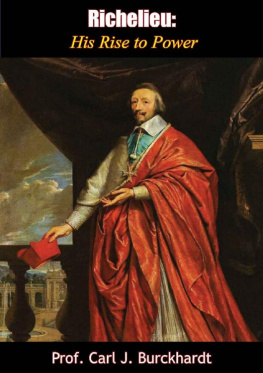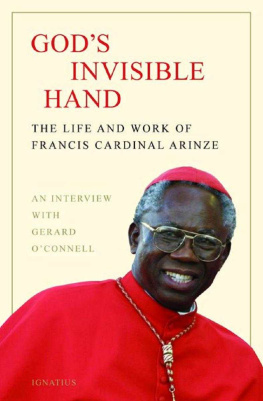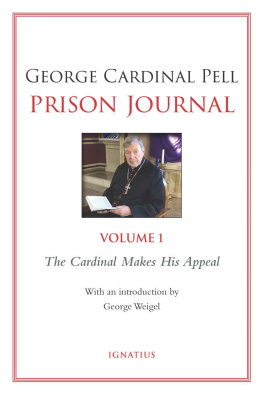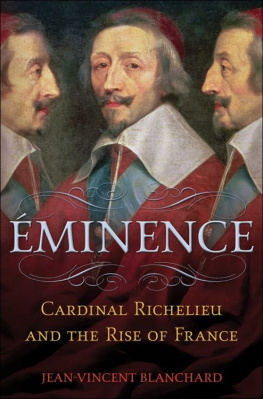
This edition is published by BORODINO BOOKS www.pp-publishing.com
To join our mailing list for new titles or for issues with our books borodinobooks@gmail.com
Or on Facebook
Text originally published in 1940 under the same title.
Borodino Books 2017, all rights reserved. No part of this publication may be reproduced, stored in a retrieval system or transmitted by any means, electrical, mechanical or otherwise without the written permission of the copyright holder.
Publishers Note
Although in most cases we have retained the Authors original spelling and grammar to authentically reproduce the work of the Author and the original intent of such material, some additional notes and clarifications have been added for the modern readers benefit.
We have also made every effort to include all maps and illustrations of the original edition the limitations of formatting do not allow of including larger maps, we will upload as many of these maps as possible.
RICHELIEU
His Rise to Power
by
CARL J. BURCKHARDT
TRANSLATED AND ABRIDGED BY
EDWIN AND WILLA MUIR
TABLE OF CONTENTS
Contents
CHAPTER I The Young Richelieu
WHEREVER THE KINGS of France turned at the end of the sixteenth century the power of the Hapsburgs confronted them, the greatest power of that time encircling the boundaries of their distracted realm. There were many weak, undefended and open places in the body of the French territories, with their still indeterminate frontiers, and the inner structure of the country was still far from stable. The idea of national unity was only then emerging into consciousness. The great feudal nobles, grown too powerful, played at high treason; the petty nobles sold themselves to the highest bidder; the Protestants were an even greater danger: a State within the State. The King of France had to maintain himself against the Hapsburgs in Madrid and Vienna, their empire worldwide, and at the same time against the nobles and sectarians of his own country, who leagued themselves with foreign powers whenever they felt it expedient.
France in the sixteenth century had reached the same state of misery which Germany attained in the seventeenth during the Thirty Years War: laid waste, torn into factions, reeling from plague to plague and from famine to famine. The realm staggered under a monstrous load of debt; law and order were quite in abeyance; the kingship as an institution was questioned; tyrannicide was not only tolerated as a legitimate means, but actually advocated. A series of religious and civil wars had come and gone; complete anarchy, confusion and exhaustion prevailed everywhere.
Late in the sixteenth century Henry IV, backed by the burghers and others, began the political rehabilitation of France. The mighty and resolute rise of France to unity was to last for the whole of the seventeenth century, yet it did not proceed undisturbed. Mens spirits had emerged still burning from the conflagration of the unexampled sixteenth century, and a long time was to pass before they cooled. In the sixteenth century individuals had grown too strong in a State that was too feeble; now they had to be disciplined out of their endless misery and embroilments. They had to be pieced together into a unity; a closely-knit ruling class had to be devised; a new and strict regime, a new authority had to be set up. The task was hard and unremitting to the point of desperation, involving setbacks all the time and risking collapse at every moment.
How great was the task for which these men had to nerve themselves! How vastly still loomed the power of their dangerous neighbor, Spain! Spain: that meant all the Iberian peninsula, now including Portugal; a great part of Italy (Milan and the Kingdom of Naples) with Sicily and Sardinia; and, from the Burgundian patrimony, the Netherlands and Franche-Comt. To its enormous American colonies it had added those of Portugal, scattered round Africa and about the Indian Ocean. A Spanish chronicler of the time asserted that the domain of his King exceeded twenty times the territory of the ancient Roman Empire. All Europe knew the saying: When Spain stirs the earth tremble. The huge fabric of this worldwide State rested on an army that was world-famous, the infantry tercios in particular, in whose ranks the noblest and bravest were enlisted, while at sea even the destruction of the Invincible Armada in 1588 had not permanently damaged the naval prestige of Spain.
Against this mighty power France held its own and eventually overcame it. Eventually: after long and hard endurance and a still longer preliminary period of lying in wait. The task of France was to spy out the vulnerable spots in the greatest power in Europe, to estimate in Madrid and Vienna the weaknesses of the Hapsburgs, to search for the Empires hidden, self-generating poisons, of which the most violent would be found in the struggle for German liberties.
After the premature death of Henry IV it was Cardinal Richelieu who beyond all others succeeded in detecting the frailties of the enemy; more than anyone else this political genius knew how to split the power of his opponent, how to rally new enemies against it, to stir up all that was most dangerous in it as a force for self-destruction, to encompass its downfall methodically and unremittingly through the encouragement he gave to the canker which long before had begun to invade the huge body of the Spanish Empire.
Richelieu was born in Paris on September 9, 1585, in the reign of the last Valois, Henry III, soon (in 1589) to fall by a murderers hand, like the great king he named on his deathbed as his successor, Henry IV. That extraordinary genius ascended the throne when Richelieu was four years old. For twenty-one years his rule lasted, with its infallible gift for brilliant improvisation, which made a virtue of every necessity and created out of every glaring anomaly a workable compromise leading to some future solution. A statesman of rare quality, Sully, stood by Henry IV as Richelieu was destined one day to stand by his son and successor, Louis XIII; but if in the first generation the ruler was greater than the servant, in the second the opposite was to be the case.
The scandalous bloodbath, as the Emperor Maximilian called the crime of St. Bartholomews Night, showed the fearful tension that existed between Catholic and Protestant in France. It is quite clear that in a State not yet grown to maturity and ringed round with enemies, the continuance of such a schism was bound to bring destruction: thoughtful observers of Frances destiny recognized this and acted upon it, sometimes against their deepest personal convictions. Henry IV, the greatest of them, should be mentioned first.
He had a stern struggle to conquer his kingdom. The Catholic party united against him under the League and in alliance with Spain. When the League began to split over the Spaniards Henry informed the Archbishop of Bourges that he was prepared to become a Catholic in order to save the unity and independence of the country, to preserve France for the dynasty and the dynasty for France. On July 23, 1593, he abjured the Protestant faith and received the sacraments, and in 1594 entered Paris as the King of France. Philip II, who had been fighting in France merely as the ally of the League, now waged war on his own account, but victory evaded him. Henry IV struck back vigorously, and battle succeeded battle until both sides were exhausted. But while the King of France was heading this desperate struggle his Calvinist subjects stood aside in hostile activity because of his conversion to the Catholic Church. So destructive, so blindly paralyzing, was the effect of religious division.
Next page






